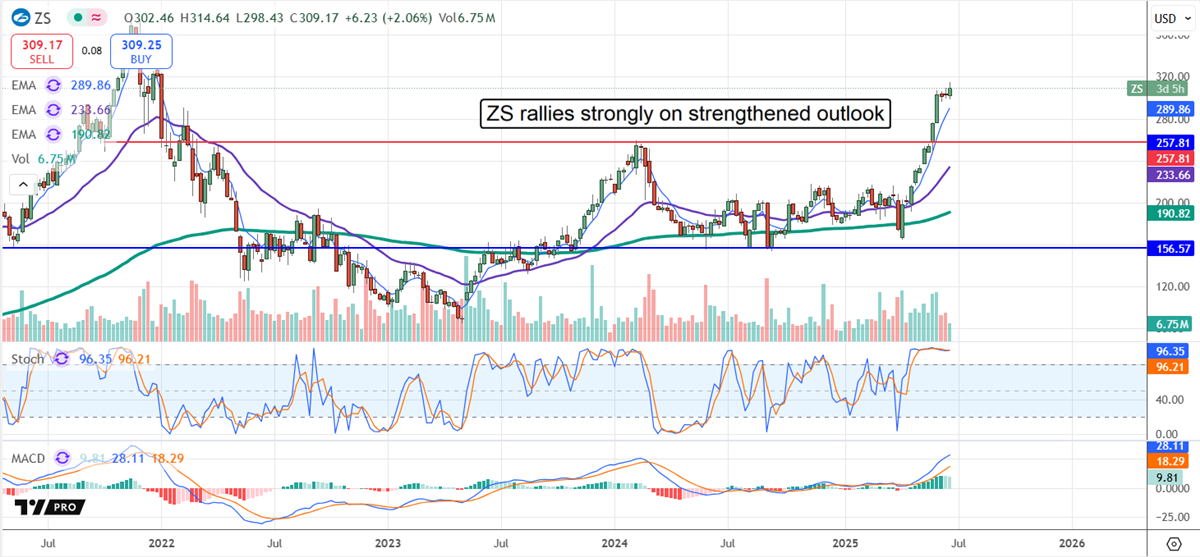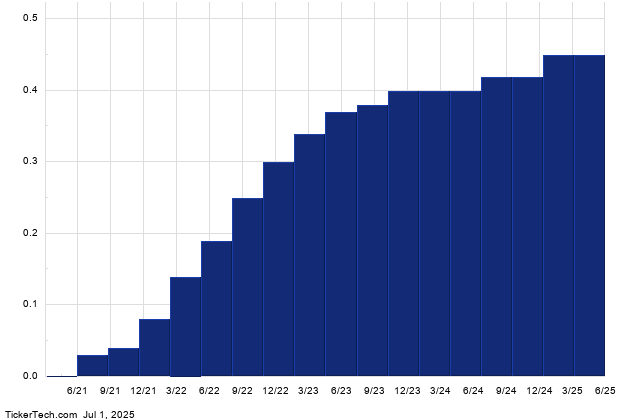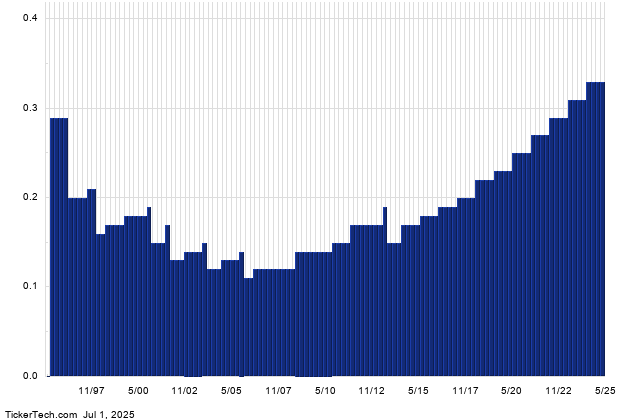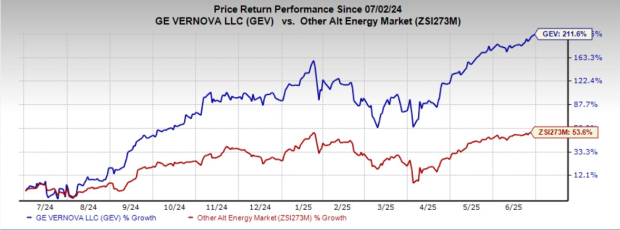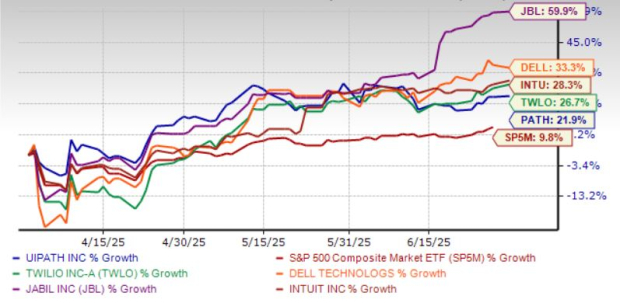Within the last month, the iconic Dow Jones Industrial Average, broad-based S&P 500, and innovation-powered Nasdaq Composite all ascended to fresh highs. While there have been pockets of strength in a variety of sectors and industries, the “Magnificent Seven” have been widely credited with lifting these major stock indexes to record levels.
Put simply, the Magnificent Seven are seven of the largest and most influential publicly traded businesses in the country. These seven juggernauts are (listed in descending order by market cap):
All seven of these companies have crushed the benchmark S&P 500 in the return column over the trailing decade. This outperformance is a big reason why investors — and members of Congress — have flocked to these businesses.

Image source: Getty Images.
Investors (and members of Congress) have historically flocked to the Magnificent Seven
More importantly, the Magnificent Seven are leaders or critical players in their respective industries:
- Microsoft’s Windows remains the undisputed leader in global desktop operating systems, while Azure is No. 2 in worldwide cloud infrastructure service spend.
- Apple’s iPhone accounts for more than half of all U.S. smartphone market share.
- Alphabet’s Google was responsible for a 91% share of global internet search in March, while wholly owned streaming service YouTube is the second most-visited social site on the planet.
- Nvidia’s A100 and H100 graphics processing units (GPUs) make up a 90% (or greater) share of GPUs deployed in high-compute data centers.
- Amazon’s e-commerce marketplace is No. 1 globally in online retail market share. Meanwhile, Amazon Web Services is the worldwide No. 1 in cloud infrastructure service spend.
- Meta Platforms owns the most sought-after social media real estate, with Facebook, WhatsApp, Instagram, and its other apps collectively attracting almost 4 billion monthly active users.
- Tesla is North America’s leading producer of electric vehicles (EVs), and is the only pure-play EV maker to have achieved recurring profits.
Despite these well-defined competitive advantages, the “Congressional trading 2023″ report from Unusual Whales shows that select lawmakers on Capitol Hill have sent three Magnificent Seven stocks to the chopping block.
Magnificent Seven stock No. 1 Congress is selling: Nvidia
Although Former House Speaker Nancy Pelosi (D-CA) and her venture capitalist husband have made a small fortune purchasing call options in the infrastructure backbone of the artificial intelligence (AI) revolution, when it comes to the purchasing and selling of common shares, members of Congress were decidedly sellers of Nvidia stock in 2023. Collectively, $1.76 million shares were sold by lawmakers last year.
The biggest seller of all, according to data from Capitol Trades, has been House Rep. Dan Meuser (R-PA). Between May 5, 2023 and Aug. 14, 2023, five sell orders were executed for Meuser, ranging from just $1,000 to $15,000, up to a sell order of $250,000 to $500,000.
Aside from simple profit-taking, there are three key reasons shares of Nvidia may be headed notably lower.
To start with, every next-big-thing investment trend since the advent of the internet 30 years ago has worked its way through an early innings bubble. Investors have a tendency to overestimate the uptake and adoption of new innovations, and AI is unlikely to be the exception to this unwritten rule.
Secondly, Nvidia has the potential to cannibalize its own pricing power in the coming quarters. The scarcity of its in-demand GPUs drove the price of its A100 and H100 chips into the stratosphere last year. As Nvidia brings more production to market, and new competitors enter the space, GPU scarcity will decline. In turn, Nvidia’s gross margin should retrace.
The third issue, which I believe is Nvidia’s biggest hurdle, is that its top four customers (Microsoft, Meta Platforms, Amazon, and Alphabet) are all developing in-house GPUs of their own. These Magnificent Seven components account for roughly 40% of Nvidia’s sales, and we’re probably witnessing a peak in orders from these industry titans.

Image source: Getty Images.
Magnificent Seven stock No. 2 Congress is selling: Microsoft
The second Magnificent Seven stock that members of Congress have been steady sellers of is the largest publicly traded company, Microsoft. Though Microsoft is listed on Unusual Whales’ heatmap as one of the most-purchased stocks in 2023 ($1.97 million shares bought by lawmakers), members of Congress collectively sold $11.61 million shares. That’s a net of $9.64 million worth of Microsoft shares that were sold last year.
Whereas Nvidia had one notable seller, a number of lawmakers couldn’t stop selling shares of Microsoft:
- House Rep. Kevin Hern (R-OK) dumped between $1 million and $5 million in shares on Jan. 4, 2023.
- House Rep. Suzan DelBene (D-WA) sold between $250,000 and $500,000 in shares on both March 1, 2023 and Aug. 30, 2023.
- Senator Tommy Tuberville (R-AL) shed $250,000 to $500,000 worth of Microsoft stock on June 20, 2023.
- House Rep. Michael McCaul (R-TX) sold multiple rounds of Microsoft stock that commonly ranged between five-and-six figures throughout 2023.
The likeliest reason for this selling is simple profit-taking. Shares of the company gained 57% last year, with the company’s investments in AI fueling its ascent.
Another reason lawmakers may have headed for the exit is Microsoft’s valuation. Although Microsoft is an absolute cash cow, it ended April 19 at a multiple of nearly 32 times forward-year earnings. For some context, this is about a 10% premium to Microsoft’s forward-year earnings multiple over the trailing five-year period.
Similar to Nvidia, members of Congress might be concerned about a bubble brewing in the AI space. Microsoft has aggressively invested in OpenAI, the company behind popular chatbot ChatGPT, and has been incorporating generative AI solutions into Azure. If history rhymes, once more, and the AI bubble bursts, some of Microsoft’s valuation premium may be wiped away.
Magnificent Seven Stock No. 3 Congress is selling: Meta Platforms
The third Magnificent Seven stock that members of Congress can’t stop selling is social media maven Meta Platforms. Though Meta doesn’t appear on Unusual Whales’ heatmap of congressional buying activity, it was one of the most-actively sold communication services providers in 2023, with aggregate selling of $2.6 million.
The culprit for the lion’s share of this selling activity in Meta is Michael McCaul, Congress’ second most-active stock trader (1,826 trades completed in 2023). In addition to dumping shares of Microsoft on numerous occasions, McCaul sold shares of Meta 16 times last year, based on data provided by Capitol Trades.
As with Nvidia and Microsoft, profit-taking is a logical reason why lawmakers headed for the exit in 2023. Meta was one of the top-performing megacap stocks last year, with its AI ties clearly providing a boost.
Another catalyst that may have encouraged members of Congress to pare down their stakes in Meta is the growing likelihood of a U.S. recession. Select predictive indicators and money-based metrics suggest a downturn in the U.S. economy may not be far off. Meta generated close to 98% of its revenue from advertising in 2023, and businesses aren’t shy about reducing their ad spending when trouble arises. Although recessions are short-lived, they could hit Meta harder than other Magnificent Seven components.
The final factor that may be behind Congress’ selling of Meta stock is the increasingly competitive social media landscape. The continued popularity of TikTok serves as formidable competition and could result in weaker ad-pricing power for Facebook, the top social media platform in the world.
For what it’s worth, I believe McCaul has made a big mistake parting with his shares of Meta Platforms.
Should you invest $1,000 in Nvidia right now?
Before you buy stock in Nvidia, consider this:
The Motley Fool Stock Advisor analyst team just identified what they believe are the 10 best stocks for investors to buy now… and Nvidia wasn’t one of them. The 10 stocks that made the cut could produce monster returns in the coming years.
Stock Advisor provides investors with an easy-to-follow blueprint for success, including guidance on building a portfolio, regular updates from analysts, and two new stock picks each month. The Stock Advisor service has more than tripled the return of S&P 500 since 2002*.
See the 10 stocks
*Stock Advisor returns as of April 22, 2024
Suzanne Frey, an executive at Alphabet, is a member of The Motley Fool’s board of directors. Randi Zuckerberg, a former director of market development and spokeswoman for Facebook and sister to Meta Platforms CEO Mark Zuckerberg, is a member of The Motley Fool’s board of directors. John Mackey, former CEO of Whole Foods Market, an Amazon subsidiary, is a member of The Motley Fool’s board of directors. Sean Williams has positions in Alphabet, Amazon, and Meta Platforms. The Motley Fool has positions in and recommends Alphabet, Amazon, Apple, Meta Platforms, Microsoft, Nvidia, and Tesla. The Motley Fool recommends the following options: long January 2026 $395 calls on Microsoft and short January 2026 $405 calls on Microsoft. The Motley Fool has a disclosure policy.
The views and opinions expressed herein are the views and opinions of the author and do not necessarily reflect those of Nasdaq, Inc.





